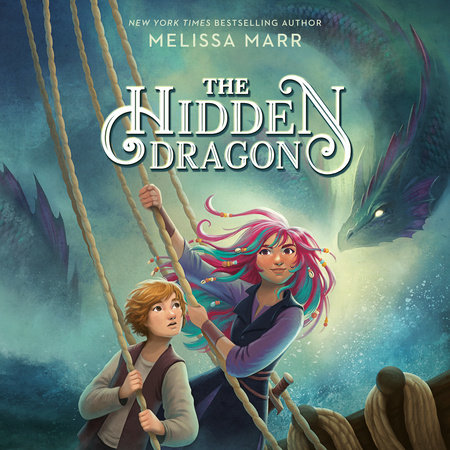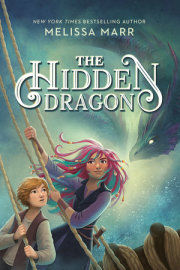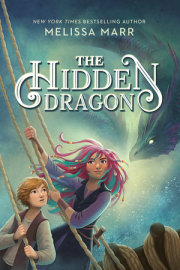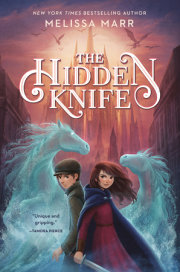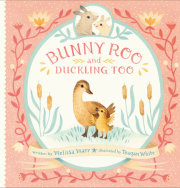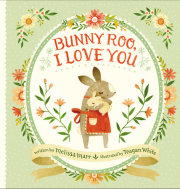PrologueAt first when the door between worlds opened, it was mostly the creatures that flew who went. Gargoyles crossed. Faeries crossed. Even a few dragonets crossed. The water things couldn’t pass as easily—except for the kelpies. They needed only a teaspoon of water at a time to slip from world to world.
No logic to kelpies, shrinking themselves into a million droplets all hither and dither.
Marian did not shrink. She was what she was—no larger, no smaller. And she wasn’t willing to scrape a single shimmering dragon scale against the doorway. It was simply not suitable for anyone with dignity to behave as the kelpies did, or for that matter, as dragonets did. They were both embarrassments in their way.
But then a few of the smaller ones went through the opening. And when Marian watched the flicker and flash of a hatchling darting through the door, she
had to follow! None of her kind’s hatchlings would be left alone in that new world. Marian would make sure of it.
The children were everything, and if they were not taken care of and adored, what was the point of
anything else? Some types of creatures had nests they didn’t tend. Other kinds of beings hovered over their own young but were hostile to young that weren’t
theirs. Marian, however, was certain that
all young were precious—not
only dragons. She took it upon herself to collect any hatchlings without parents. Her wings were large enough to shelter more than herself.
So Marian jabbed her claws into the door, and she tugged. A screech rippled through the sea. It was loud enough to embarrass Marian, but she kept moving.
Opening the door so very wide meant that many more sea creatures would pass through to the other side.
Dragon hatchlings tumbled through the gate in a great
whoosh. Marian watched them stretch and grow in their new home, but she reminded herself that there were fish aplenty. There was also sea grass that grew in underwater forests. Plants reached as tall as the land dwellers’ trees—and then grew higher still. Her kind would not want for food or space, despite the size they reached in this new water.
The only rule she set was that they must all be careful of the creatures of the land. One never knew what
they were like. Dangerous things lived on land.
Soon many sea creatures frolicked and thrived in the deep, where they had food and safety. And in the very bottom of that deep dark water were sparkling, glimmering things that Marian began to gather. Sometimes they had to topple a ship to get the golden sparklies or the stone sparklies. That was easy enough. She was, after all, a dragon.
The only problem left for Marian was the Otter.
The sea dragons all heard the Otter’s voice, and sometimes they couldn’t resist going splashing to the surface to seek her out. It was dangerous, but Marian understood the impulse. She desperately wanted to be near the Otter again, too.
Twelve Years Later
Chapter 1London
London had every intention of buying passage out of Glass City. He carried his savings—gold coins and silver ones, a few bits of copper, and assorted gems—as well as a small bundle of clothes, as he set off toward the docks. London had been there often enough that his feet could find it even if his eyes were closed. Ships meant freedom, a new start, adventure. Who
wouldn’t dream of setting sail?
“This is the day!” London stepped to the edge of the dock, scanning quickly for kelpies. Getting eaten because he was careless would be a terrible start—and end—to his future.
Seeing no water horses rising to nibble passersby, London relaxed.
Birds’ cries and people’s voices mixed with the sounds of water lapping against hulls. Ships of all kinds cluttered the harbor. Personal boats and tall ships mixed with barges and tugs.
But when London spotted a relocation ship on the far end of the dock—
not the kind of ship he was hoping to board—he shivered. People who were a “burden on the empire” got shipped away, packed like fish in a barrel, to work in one of the wild lands the empire now owned. London remembered watching his mum being taken away on one of those. He liked to imagine her in a better place, teaching other kids in some foreign land, but he wasn’t even sure if she’d survived the journey.
He’d stayed here at the docks that long-ago day, alone and hungry, until some kids found him. They took him with them, and that’s how he ended up living underground.
Now a man’s voice rang out: “You there, lad!”
It was one of the kingdom’s patrol officers. They seemed to be all over lately, gathering up kids.
“If there’s room, grab up three more.”
London hoped the soldier didn’t mean him, but just in case, he ducked behind a barrel and crept along the ground, using more barrels and giant crates as cover.
It would be awful to get captured now. London had spent years avoiding being sent to a workhouse, a fate that was the usual choice for orphans these days. The crown had replaced schools with workhouses, arguing that the children of
good families had at-home learning and the ones who couldn’t learn at home ought to be put to work as soon as possible, since it was their future.
It was nonsense.
His mum had been a teacher, but there was no work for teachers once there were no more city schools. The crown simply hadn’t cared about teachers—or kids—for years.
London thought back to that day his mother had been shoved onto the ship.
Run, love. Run and hide. Mum! Go on. I’ll find you. Only take what you need. I’ll find you someday, she said, shoving him toward a pile of cargo and running.
He heard her cry. He saw them capture her.
That was five years ago, and London still came to the docks, hoping she’d be here one of these days. He watched ships carry away other moms and dads, big brothers and sisters, too. He’d looked at a lot of faces, and never saw any of them come back.
“No one comes back,” he muttered.
His footsteps sounded too loud as he slipped between crates to try to find the passenger ship that would take him to Northland City. He’d been eyeing the sailing options for weeks, and finally there was one leaving today.
He stopped at the bottom of the walkway and noticed a girl about his age shimmying up a tall pole—or whatever the thing that held the sails was called. This ship appeared to be a cargo vessel, though. No cabins for passengers here!
“You, lad!” shouted a tall, bony fellow. “You one of the new ones?”
What if he slipped on board
this ship and saved the money he was planning to spend on a ticket?
“I am,” London said, deciding quickly that it was best to get on this ship while officers were circling. In the distance he could see the one who’d been pursuing him.
“Help get these crates on board, and then you can go get settled into quarters,” the older boy said.
London grabbed one of the largest crates and lifted. “Lead the way.”
“Save a bit of energy in case there’s no wind and we need to row!” The boy smiled and grabbed another wooden box.
London laughed and shared a joke of his own. “Nah. Get it all on the ship so we can have a kip.”
The boy paused. “A
kip? You a Northlander, then?”
“Heading home,” London said, which was sort of true. He did intend to make Northland his home.
They loaded the rest of the cargo, and then, as they were walking away from the cargo hold, the other boy said, “Be sure to check in with Tanner if you haven’t already, Northy.”
When they separated, London headed back to the ship’s cargo area and squeezed into a space he’d left between crates, pulled a tarp down, and went to sleep under it. He hadn’t had a chance to buy any food, but he’d find food in the hold. He patted the bag of money deep in his pocket—stowing away on the ship meant it was
all still there.
The thought of the gold he carried gave him a momentary twinge.
No one took gold to sea. It was bad luck. That’s why London had only enough gold coins to buy his ticket, and the rest of his savings was in silver, copper, and jewels.
He debated tossing the gold overboard.
Wasn’t it just a superstition, though? What danger could there possibly be in carrying gold to sea? The only things in the sea—other than fish—were kelpies, and if the water horses cared about gold, they’d bother the nobs walking along the canals in Glass City.
London wasn’t going to let superstition steal his money. He kept his gold coins.
Chapter 2Otter Ottilie Jo Maul wasn’t sure she’d ever feel right on land. Her family and friends called her Otter, since she was only at home in or on water. Her fathers claimed they used to have to tether her to her family’s ship, the H.M.S.
Tempest, to keep her from leaping overboard.
Today, though, she was on land, which had the peculiar tendency to
not sway like the deck of her ship. She wasn’t good at being on a surface that didn’t move.
Glass City wasn’t the absolute
worst place. The canals, at least, stretched along the streets. Within them were dark waters that would work like roads if one sailed inland. No one was allowed to do so in the royal city, though. Boats must dock. Sailors must walk on land.
It was absurd. That’s what it was.
“Sick already, lass?” Her father glanced at her, worry in his eyes.
Captain Maul looked too big for the narrow city streets. Although if you asked Otter, he was as polished as the finest man in the royal court—but not as mean. On Otter’s last visit to land, she’d spewed her lunch all over the shoes of a man at court and gotten no sympathy.
Hopefully, there would be no vomiting this visit!
“Not too bad,” Otter hedged.
“Glad your stomach’s cooperating. Got to keep all your vittles inside!” As Captain Maul nodded, his enormous beard made a soft clattering sound. He kept his beard braided, and each braid ended with tiny beads or clips. Otter had liked the effect so much that she copied it on her own multihued hair; she had also woven in bits of shells and sparkling stones.
“
Yes, but I belong on the ship,” Otter grumbled, trying not to wince from the dizzy way she always felt when the land wasn’t moving.
“Ottilie Jo Maul.”
She glanced at him.
“Do you
need to go back to the ship?”
She sighed. “Da . . .”
“You
said you could do it this time,” he reminded her. Gruff as he was, he sounded worried. “Do you need help?”
Otter looked away. “I was hoping I could do without.”
Her father unslung a bag from his shoulder, and from within it, he pulled a cloak. When he settled it around her shoulders, she breathed a sigh of relief. Only one material countered her land sickness: dragon hide.
Most people didn’t even know dragons existed, and the Glass Queen was determined to keep it that way. The H.M.S.
Tempest was the only vessel that sought them out, sailing into seas that Her Majesty had declared unnavigable in order to keep all other ships out. And to make their cover story work, the
Tempest also carried cargo to the north for the queen. In that regard, they functioned like any other ship. It was the cargo they brought home that made all the difference.
Only the captain and crew had the queen’s papers to sail the Crimson Sea, and only the H.M.S.
Tempest could collect dragon hide.
Sometimes Otter wondered about how easily the queen lied, but these lies kept the dragons safe. Otter would feel worse if people hunted the dragons.
Captain Maul and his crew were the only ones who knew the truth—the Crimson Sea
could be treacherous, not because of rocks or currents, but because of thrashing dragons. This was a risk they took, though, to carry some of the most valuable cargo in the Glass Empire. Dragon skin, the layer they shed, was the stuff the queen needed for her guards’ armor and it was the stuff that every gown the queen wore contained. It was impervious to fire, difficult to pierce, and water repelling. Every member of the crew of the
Tempest also got a set of skins to wear as a cloak or an underlayer. Besides the Queen’s Ravens, they were the only ones allowed to wear it.
If they sold the skin, they’d be wealthy—or maybe dead. Crossing the Glass Queen sounded terribly dangerous, even though she’d
seemed nice enough when Otter first met her. Although their actual meeting was cut short on account of Otter’s sick stomach, the queen didn’t seem upset.
And she’d invited Otter back.
Otter and her father walked in silence toward the Glass Castle, and as Otter looked up at the towers piercing the sky, she found it hard to understand how anyone could like a building so tall that flying buttresses were essential to keep the structure from collapsing. Living in a place like the castle meant being far from the ground, and that was way too far from the water.
When they arrived, the captain told a guard, “The Glass Queen is expecting us.”
The Raven nodded. Every Raven knew that the H.M.S.
Tempest sailed to the reaches of the map in order to bring that “fabric” back. Even when it was dyed black, it kept the iridescence of dragons, so their armor looked like the sheen of raven feathers.
“Captain Maul.” The Raven nodded. “Little Maul.”
Otter rolled her eyes. “It’s
Otter, if you please.”
Before entering the castle, Otter’s father held out a hand.
Silently, she gave him her cloak. They didn’t want to draw attention to the fact that she had a cloak made of the same fabric as the armor that the Ravens wore. The Ravens knew the secret of the dragon hide, but not everyone in the castle was a Raven, so it was best to avoid wearing dragon skin within Glass City lest there be awkward questions.
They followed the guard into the castle—and up staircase after staircase until they were on the topmost floor of the highest tower of the castle.
The Raven ushered them into a room, and they were suddenly alone with the queen—well, as alone as the queen ever was. There was still one guard at the door in a high tower in the Glass Castle. Other guards kept every door and passage to the castle secure.
The queen smiled at them. “Nice to see you brought the child, Captain Maul.”
Her father shrugged. “Someday, she’ll be the one you need to deal with, Your Ladyship, so she needs to get used to you. I get older every time I turn around.”
“Indeed.” The queen looked at Otter as she spoke to her father. “Have you considered sending her to Corvus until she needs to take over the ship? My heir attends the school.”
“Ottilie doesn’t like being away from the sea, Your Lady.”
The queen sighed loudly. “Your
Majesty, Captain. The proper address in my empire is ‘Your Majesty.’ ”
“Sorry, Your Majesty. My daughter is happiest at sea. Same as me. Seawater in our veins, don’t you know?”
“Scientifically impossible, Captain Maul.” The Glass Queen had a smile that looked surprisingly friendly now. For all that people whispered she was icy and heartless, she’d only ever spoken kindly to Otter. Now she turned to Otter and asked, “So how are you feeling on the land this time?”
“I’m doing my best, Your Majesty,” Otter said. “Doesn’t make sense how it stays still.”
“I see. And if the land were to move . . .”
“It would help,” Otter managed to say.
She was trying hard not to show her discomfort. Being up in a stone tower this far from the sea wasn’t doing great things for her stomach. She closed her eyes and thought watery thoughts of sea, salt, wind. She imagined swaying over the water, watching for dragons. For a moment, she could taste the brine in the air.
Wings brushed her cheeks, and Otter opened her eyes to see the tail end of what looked like an entire flock of dragonets being chased out of the room by a gargoyle.
The queen’s voice sounded far away as she asked, “What
is she?”
“Ottilie is my
daughter, Your Majesty.” He handed Otter his bag, which held her cloak.
She slid her hand inside and touched the dragon hide—and the twisting in her belly eased. Touching that magical stuff made her land sickness settle briefly, same as if she touched the sea.
The queen looked concerned. “Perhaps my alchemist can create a tincture to ease your discomfort on land, Ottilie. He asked for challenges of the nonlethal sort recently.”
The Glass Queen motioned to the Raven at the door. When her guard stepped closer, the queen ordered, “Send for Nightshade. I will meet with him when these guests leave.”
Once the Raven was gone, Otter felt her father’s heavy hand pat her back, pushing her closer to the queen.
“You must take care, Captain Maul,” the queen said softly. “My Ravens tell me that there are plots to invade your hunting ground and steal your cargo. I
need those plots to be thwarted.”
“But how can they invade?” Otter blurted out. “No one knows what we harvest. And the
Tempest is the fastest ship in the empire!”
Otter didn’t mention that they were fast because they followed dragons—which let the ship find the best currents. They
also caught just enough fish for the crew, thanks to dragons.
“We have a traitor,” the queen announced.
“Your Majesty”—Captain Maul cleared his throat—“Ottilie is right. No one else could sail where we do. The seas there—”
“Yes, yes, I know. Maelstroms. Shallows. No one can cross the great whirlpool to the Crimson Sea.” The queen continued to speak softly, despite their apparent privacy. “I am aware. But greed erases logic sometimes, and my betrayer knows what precious cargo you gather.”
Greed would have to be awfully powerful to send anyone else to the part of the sea where the H.M.S.
Tempest sailed. The whirlpools, for it wasn’t just one, were immense. They churned the sea in a froth, and sometimes Otter doubted that the
Tempest would stay above water.
“I am also aware that you have an understanding with the things under the water that might otherwise add dangers to those storms and whirlpools,” the queen added in a whisper.
Otter nodded. It was more than an “understanding” with the dragons—it was love, awe, and respect.
During a few storms, dragons had even nudged the ship to safety.
The queen looked to the gargoyle that was perched on the ledge of the tower window before she withdrew a parchment from her robes. It had the royal seal impressed upon it in deep-blue wax. “No one else knows what you do for me, Captain. It must always stay that way.”
The papers were the annual decree that the H.M.S.
Tempest was a royally sanctioned vessel. Boarding or attacking the ship was an assault on the Glass Queen herself. No other ship had such a status, and Otter had never seen the paper before.
“I won’t tell,” Otter swore. “Because they . . . the dragons deserve . . .”
“You regard the dragons with favor?” the Glass Queen asked.
“Yes! We are alive only because they allow it. They could sink us if they chose,” Otter said.
“And yet you seek the sea,” the queen said.
Otter and her father exchanged a look. There was no way to explain it, not to landfolk. Being out in the sea on a still day—no land in sight—was pure peace. And when the wind rose to fill sails, sliding the ship across the water, it was a marvel.
“She’s magic,” her father said, glancing at Otter.
“That explains many things,” the queen murmured.
Otter nodded. They
were talking about the sea, right?
“You would be an asset to my Ravens,” the queen continued, “but I am happy that you are out there protecting our precious cargo.”
“We will do everything in our power to make sure the
Tempest is safe,” the captain said. “We’re just finishing up loading the outgoing cargo for the trip north. We’ll be careful—”
“And if anything does happen, we’ll dump our
other cargo before it goes to your enemies!” Otter declared.
“Sail safely,” the queen said.
Then she held out a second parchment toward Captain Maul. This one was sealed with black wax. “If I should perish before you return,” she said, “these are the people you must tell of your inbound cargo.”
He bowed deeply. “Your Majesty. We shall not fail you.”
“You never do, Maul.” The Glass Queen looked at Otter and said, “It is an honor to speak with you, Ottilie.”
Then, in a blink, they were dismissed.
Her father said nothing until they were boarding the
Tempest. Then he put his arm around her shoulders. “I think
you are the best magic I’ve seen, Ottilie. Tan and I would be lost without you.”
“Same. I’m lucky to have such good dads.”
“Right you are. Now, go on with you. We have work to do. Seas to sail. Pirates to avoid.”
“Yes, sir, Captain,” she said, grinning. She might be worried about the things the queen had said, but all that mattered now was that the
Tempest was setting sail.
Otter would be where she belonged again—at sea.
Copyright © 2023 by Melissa Marr. All rights reserved. No part of this excerpt may be reproduced or reprinted without permission in writing from the publisher.

